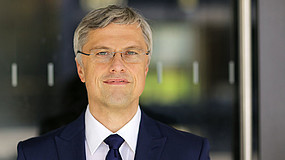The fluid mechanics/machinery laboratory deals with methods for investigating the behavior of fluids at rest and in motion. This includes measurements of pressure distributions, velocity profiles or flow forces. On the other hand, possibilities for characterizing the machines required for energy transfer (turbines, pumps, compressors, blowers) are dealt with.
Students learn how to use various methods of flow measurement technology.
In addition to conventional measuring devices (pneumatic pressure probes, U-tube / inclined tube manometers, pressure sensors), this also includes high-resolution measurement methods in terms of time and space (hot-wire and laser Doppler anemometry). This knowledge forms the basis for subsequent investigations on turbomachinery. Particular emphasis is placed on the use of similarity indices, which must be taken into account for the comparability of measurement results.
The laboratory is attended by students on the "Energy and Environmental Engineering", "Mechanical Engineering" and "Ecology and Environmental Protection" courses. The practical courses are used to gain a practical understanding of the courses "Fluid Mechanics I", "Fluid Mechanics II", "Fluid Energy Machines", "Regenerative Energy Technology" and "Computational Fluid Mechanics". As a student assistant or as part of project/practical semester/bachelor's/diploma/master's theses, students have the opportunity to gain a deeper insight into interesting fluid mechanics topics.
Furthermore, the laboratory is also a cooperation partner for relevant questions from industry.
The instructions for the practicals can be downloaded by students from the "OPAL" education portal in advance of an experiment. These provide a precise insight into the upcoming procedures and thus enable the necessary preparation of the theoretical foundations. There is an introductory lecture and an evaluation lecture for each module's practical course. The practical course itself is completed in small groups with a maximum group size of 6 students. After a short colloquium, which deals with the specific practical aspects, the existing knowledge is tested in a test. This ensures that the students taking part in the practical course are adequately prepared for the necessary work steps. This is followed by the implementation phase, during which the students primarily work independently. Passing the test and submitting a report accepted by the supervisor are examination requirements for the respective course.
Registration is only necessary for guided tours. Enrolled students will be informed of the internship dates as part of the relevant course.
Here you will find a list of current topics for student work.
Construction and commissioning of a test rig for the investigation of a gas cyclone
House ZVIIc, Hall 8
House ZVIIb, Hall 8

